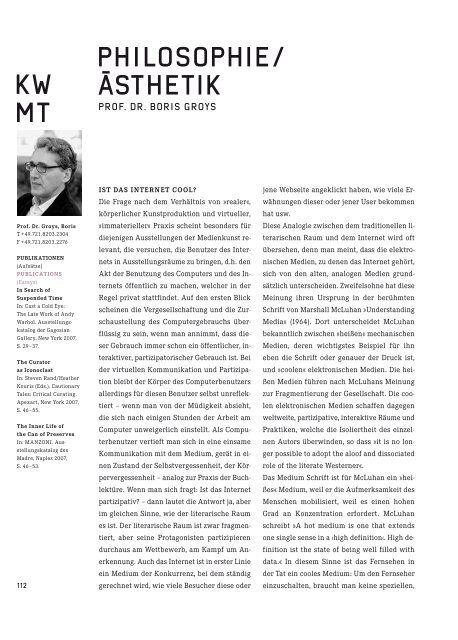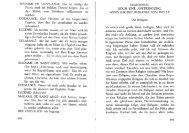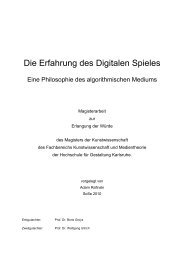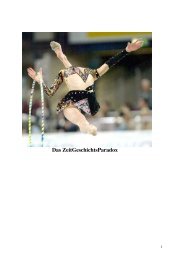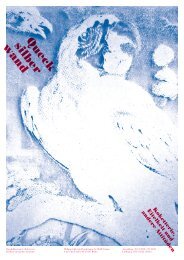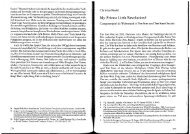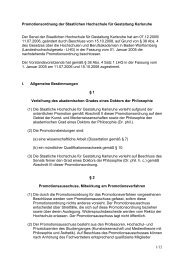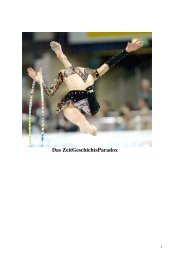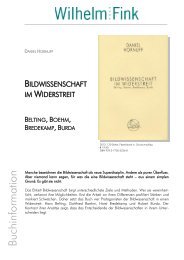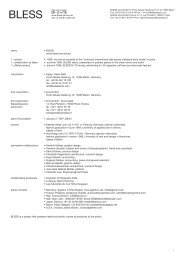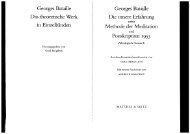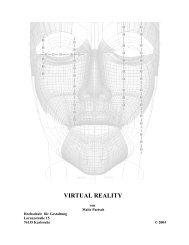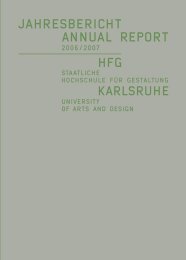jahresbericht annual report - Staatliche Hochschule für Gestaltung ...
jahresbericht annual report - Staatliche Hochschule für Gestaltung ...
jahresbericht annual report - Staatliche Hochschule für Gestaltung ...
Erfolgreiche ePaper selbst erstellen
Machen Sie aus Ihren PDF Publikationen ein blätterbares Flipbook mit unserer einzigartigen Google optimierten e-Paper Software.
K W<br />
M T<br />
Prof. dr. groys, Boris<br />
T + 4 9.721.8203.2304<br />
F + 4 9.721.8203.2276<br />
PuBLikatiOnen<br />
(Aufsätze)<br />
PuBLicatiOnS<br />
(Essays)<br />
in Search of<br />
Suspended time<br />
In: Cast a Cold Eye:<br />
The Late Work of Andy<br />
Warhol. Ausstellungs-<br />
katalog der Gagosian<br />
Gallery, New York 2007,<br />
S. 29–37.<br />
the curator<br />
as iconoclast<br />
In: Steven Rand/Heather<br />
Kouris (Eds.). Cautionary<br />
Tales: Critical Curating.<br />
Apexart, New York 2007,<br />
S. 46–55.<br />
the inner Life of<br />
the can of Preserves<br />
In: MANZONI. Ausstellungskatalog<br />
des<br />
Madre, Naples 2007,<br />
S. 46–53.<br />
112<br />
P H I LO S O P H I E /<br />
ÄST H ETI K<br />
P R O F. D R . B O R I S G R O yS<br />
iSt daS internet cOOL?<br />
Die Frage nach dem Verhältnis von »realer«,<br />
körperlicher Kunstproduktion und virtueller,<br />
»immaterieller« Praxis scheint besonders <strong>für</strong><br />
diejenigen Ausstellungen der Medienkunst re-<br />
levant, die versuchen, die Benutzer des Inter-<br />
nets in Ausstellungsräume zu bringen, d.h. den<br />
Akt der Benutzung des Computers und des In-<br />
ternets öffentlich zu machen, welcher in der<br />
Regel privat stattfindet. Auf den ersten Blick<br />
scheinen die Vergesellschaftung und die Zur-<br />
schaustellung des Computergebrauchs über-<br />
flüssig zu sein, wenn man annimmt, dass die-<br />
ser Gebrauch immer schon ein öffentlicher, in-<br />
teraktiver, partizipatorischer Gebrauch ist. Bei<br />
der virtuellen Kommunikation und Partizipa-<br />
tion bleibt der Körper des Computerbenutzers<br />
allerdings <strong>für</strong> diesen Benutzer selbst unreflek-<br />
tiert – wenn man von der Müdigkeit absieht,<br />
die sich nach einigen Stunden der Arbeit am<br />
Computer unweigerlich einstellt. Als Compu-<br />
terbenutzer vertieft man sich in eine einsame<br />
Kommunikation mit dem Medium, gerät in ei-<br />
nen Zustand der Selbstvergessenheit, der Kör-<br />
pervergessenheit – analog zur Praxis der Buch-<br />
lektüre. Wenn man sich fragt: Ist das Internet<br />
partizipativ? – dann lautet die Antwort ja, aber<br />
im gleichen Sinne, wie der literarische Raum<br />
es ist. Der literarische Raum ist zwar fragmen-<br />
tiert, aber seine Protagonisten partizipieren<br />
durchaus am Wettbewerb, am Kampf um An-<br />
erkennung. Auch das Internet ist in erster Linie<br />
ein Medium der Konkurrenz, bei dem ständig<br />
gerechnet wird, wie viele Besucher diese oder<br />
jene Webseite angeklickt haben, wie viele Er-<br />
wähnungen dieser oder jener User bekommen<br />
hat usw.<br />
Diese Analogie zwischen dem traditionellen li-<br />
terarischen Raum und dem Internet wird oft<br />
übersehen, denn man meint, dass die elektro-<br />
nischen Medien, zu denen das Internet gehört,<br />
sich von den alten, analogen Medien grund-<br />
sätzlich unterscheiden. Zweifelsohne hat diese<br />
Meinung ihren Ursprung in der berühmten<br />
Schrift von Marshall McLuhan »Understanding<br />
Media« (1964). Dort unterscheidet McLuhan<br />
bekanntlich zwischen »heißen« mechanischen<br />
Medien, deren wichtigstes Beispiel <strong>für</strong> ihn<br />
eben die Schrift oder genauer der Druck ist,<br />
und »coolen« elektronischen Medien. Die hei-<br />
ßen Medien führen nach McLuhans Meinung<br />
zur Fragmentierung der Gesellschaft. Die coo-<br />
len elektronischen Medien schaffen dagegen<br />
weltweite, partizipative, interaktive Räume und<br />
Praktiken, welche die Isoliertheit des einzel-<br />
nen Autors überwinden, so dass »it is no lon-<br />
ger possible to adopt the aloof and dissociated<br />
role of the literate Westerner«.<br />
Das Medium Schrift ist <strong>für</strong> McLuhan ein »hei-<br />
ßes« Medium, weil er die Aufmerksamkeit des<br />
Menschen mobilisiert, weil es einen hohen<br />
Grad an Konzentration erfordert. McLuhan<br />
schreibt »A hot medium is one that extends<br />
one single sense in a ›high definition‹. High de-<br />
finition ist the state of being well filled with<br />
data.« In diesem Sinne ist das Fernsehen in<br />
der Tat ein cooles Medium: Um den Fernseher<br />
einzuschalten, braucht man keine speziellen,<br />
P H ILO S O P Hy/<br />
AEST H ETI CS<br />
P R O F. D R . B O R I S G R Oy S<br />
iS tHe internet cOOL?<br />
The question of the relationship of “real” physical art production and virtual, “immaterial” prac-<br />
tice seems particularly relevant for those media art exhibitions that attempt to get Internet<br />
users into exhibition rooms, that is, that try to make the act of using the computer and the In-<br />
ternet, which usually takes place in private, public. At first glance, the communization and ex-<br />
position of the use of the computer seems superfluous, assuming this use has always been pub-<br />
lic, interactive, and participatory. In virtual communication and participation, however, the body<br />
of the computer user remains unreflected to herself – aside from the fatigue that inevitably sets<br />
in after a couple of hours of work at the computer. As a computer user, you immerse yourself<br />
in a lone communication with the medium, you get into a state where you become oblivious of<br />
your surroundings, of your body – this is analogous to the practice of reading a book. If you ask<br />
yourself whether the Internet is participatory, the answer is yes, but only in the way that liter-<br />
ary space is. Literary space may be fragmented, but its protagonists do participate in competition,<br />
in the fight for recognition. The Internet is above all also a competitive medium, constantly run-<br />
ning calculations of how many users clicked on this or that site, how many times this or that<br />
user has been referenced, etc.<br />
This analogy between the traditional literary space and the Internet is often overlooked, because<br />
we assume that electronic media, which include the Internet, differ fundamentally from the old,<br />
analog media. There is no doubt that this opinion stems from the famous text “Understanding<br />
Media” (1964) by Marshall McLuhan. As we know, McLuhan differentiates between “hot” me-<br />
chanical media, the most important example of which is for him script, or, more specifically,<br />
print, and “cool” electronic media. Hot media, according to McLuhan, lead to a fragmentation of<br />
society. Cool, electronic media, on the other hand, create global, participatory, interactive spaces<br />
and practices that overcome the isolation of the individual authors, so that “it is no longer pos-<br />
sible to adopt the aloof and dissociated role of the literate Westerner”.<br />
The medium of script for McLuhan is a “hot” medium, since it mobilizes people’s attention by re-<br />
quiring a high degree of concentration. McLuhan writes: “A hot medium is one that extends one<br />
single sense in a ‘high definition’. High definition is the state of being well filled with data.” In<br />
this sense, TV is in fact a cool medium. You do not require any specific, professional knowledge<br />
to be able to turn on the TV. At the same time, TV is “cool” because it provides little information<br />
in a relatively loose sequence, so that the viewers can remain “cool” and unconcentrated while<br />
watching. Working with the computer, however, especially with the Internet, requires a degree<br />
of concentration that may even exceed that of reading a book. The Internet – contrary to TV — is<br />
consequently a hot medium. This explains the purpose of exhibitions that provide visitors with<br />
A H<br />
M T<br />
Prof. dr. groys, Boris<br />
T +49.721.8203.2304<br />
F + 49.721.8203.2276<br />
113


